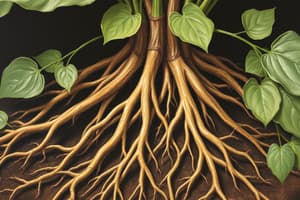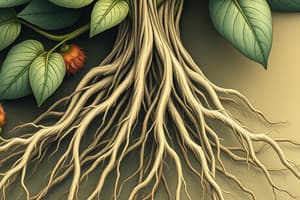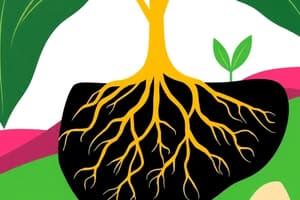Podcast
Questions and Answers
What is the primary function of the root cap?
What is the primary function of the root cap?
- To store energy for the plant
- To anchor the plant in the soil
- To absorb nutrients from the soil
- To protect the root as it grows (correct)
Which tissue type is primarily responsible for the transport of water and minerals in plants?
Which tissue type is primarily responsible for the transport of water and minerals in plants?
- Ground tissue
- Dermal tissue
- Vascular tissue (correct)
- Meristematic tissue
In which root zone do cells primarily increase in size?
In which root zone do cells primarily increase in size?
- Zone of elongation (correct)
- Zone of protection
- Zone of differentiation
- Meristematic zone
What distinguishes xylem vessels from tracheids?
What distinguishes xylem vessels from tracheids?
What is one significant role of ground tissue?
What is one significant role of ground tissue?
What characteristic differentiates monocots from dicots regarding flower parts?
What characteristic differentiates monocots from dicots regarding flower parts?
Which zone of the root is primarily responsible for the development into various tissues?
Which zone of the root is primarily responsible for the development into various tissues?
Why is it essential to use a very thin section when examining plant tissues under a microscope?
Why is it essential to use a very thin section when examining plant tissues under a microscope?
What happens in the meristematic zone of a root?
What happens in the meristematic zone of a root?
Study Notes
Root Functions and Types
- Roots anchor the plant in soil and absorb water.
- Two main types of roots: tap roots and fibrous roots.
Root Zones
- Four distinct root zones:
- Zone of Differentiation: Cells develop into dermal, ground, and vascular tissues.
- Zone of Elongation: Cells increase in size, contributing to root growth.
- Meristematic Zone: Area of active cell division producing new cells via mitosis.
- Zone of Protection: Contains a root cap to protect cells as they push through soil.
Types of Tissues in Roots
- Dermal Tissue: Functions include protection of the plant.
- Ground Tissue: Primarily involved in food storage.
- Vascular Tissue: Specialized for the transport of water, minerals (xylem), and food (phloem).
Stem and Leaf Functions
- Stems support aerial parts of the plant and may store food.
- Leaves are primarily responsible for photosynthesis and transpiration (water loss).
Xylem vs. Phloem
- Xylem transports water and minerals from roots to other parts of the plant.
- Phloem transports food produced through photosynthesis to various plant parts.
Differences in Vascular Structures
- Xylem vessels have no tapered ends, while tracheids do.
Monocots vs. Dicots
- Monocot leaf venation is parallel; dicot leaf venation is netted.
- Monocots have flower parts in multiples of three; dicots have them in fours or fives.
Dicot Stem Observations
- Plant Used: Busy Lizzie (Impatiens).
- Dicotyledon Definition: Refers to plants with two seed-leaves.
- Importance of Thin Sections: A thin slice is essential for light to pass through for microscopic examination.
- Transfer Method: Sections were transferred using forceps.
- Safe Cutting: Scalpels were used to cut away from the body for safety.
Studying That Suits You
Use AI to generate personalized quizzes and flashcards to suit your learning preferences.
Related Documents
Description
Test your knowledge on the functions, types, and zones of plant roots. This quiz covers the basic structures and roles of roots, including differentiation and tissue types. Perfect for biology students wanting to solidify their understanding of root systems.




